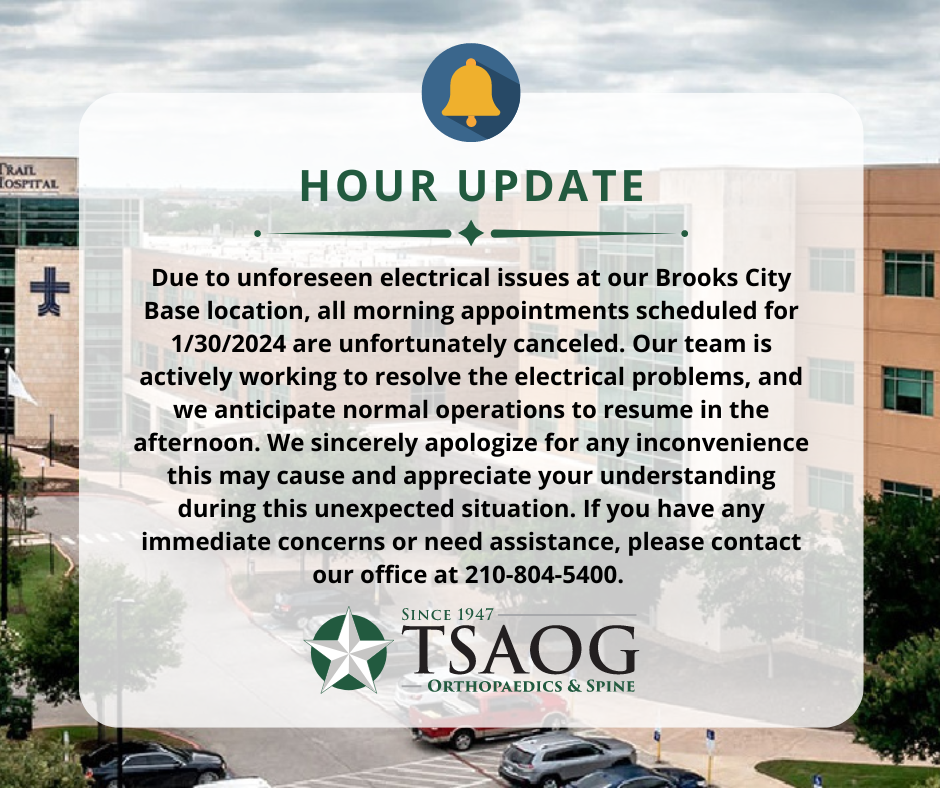Reviewed By Justin Robbins, M.D.
Board-Certified Orthopedic Surgeon, specializing in Foot & Ankle
Living with chronic ankle pain can be exhausting. It limits your ability to perform even the simplest activities, like walking, standing, or climbing stairs. Total ankle replacement, although less common than knee or hip replacements, can be a transformative solution for those with debilitating pain. By restoring mobility and alleviating discomfort, this procedure can improve your quality of life significantly.
However, not everyone is a candidate for ankle replacement. This surgery is often reserved for those who meet specific criteria, as it involves a complex assessment of your overall health, ankle condition, and daily activity levels. At TSAOG, our providers are experienced in a wide range of specialties and are here to help! In this guide, we break down some of the factors that determine whether or not an ankle replacement is the right choice.
What Determines If You Are a Good Candidate for Ankle Replacement?
Considering ankle replacement involves understanding your symptoms, health history, and treatment journey. Here are the primary factors that make someone a good candidate:
Persistent, Intense Pain
One of the clearest signs you might need ankle replacement surgery is severe pain that doesn’t go away. This pain might wake you up at night, prevent you from getting restful sleep, or interfere with your ability to work or enjoy life.
Another red flag is pain that affects daily activities–like walking, climbing stairs, or even standing for short periods. Total ankle replacement aims to address this pain by replacing the damaged joint with an artificial implant, giving you relief and improving mobility.
Decreased Range of Motion
Do you find it difficult to move your ankle, or has your range of motion diminished over time? Stiffness and weakness in the joint are common among patients with advanced arthritis or joint damage. If you’re unable to flex, rotate, or bear weight on your ankle without discomfort, a replacement could help restore movement and strength.
Arthritis Diagnosis
Arthritis, including osteoarthritis and rheumatoid arthritis, is one of the most common reasons patients seek ankle replacement. Over time, arthritis can wear down the cartilage in the joint, causing inflammation, pain, and stiffness. If imaging studies show significant damage to your ankle joint, replacement surgery might be the best solution to regain mobility.
Failure of Conservative Treatments
Before considering surgery, most patients try conservative treatments like physical therapy, anti-inflammatory medications, injections, bracing, or lifestyle modifications. If these options haven’t provided relief, it may be time to explore surgical intervention.
Overall Health
Good overall health is essential for any surgical procedure. Candidates for ankle replacement should be free from conditions that might interfere with healing, such as uncontrolled diabetes or cardiovascular disease.
Additionally, being at a healthy weight reduces stress on the new joint, improving long-term outcomes.
Who Isn’t a Good Candidate for Ankle Replacement?
Not everyone with ankle pain is a candidate for replacement surgery. Some conditions or lifestyle factors may make the procedure less effective or riskier.
Severe Bone Loss or Deformity
If your ankle bones are severely damaged or deformed, it might be challenging to place the implant correctly. In these cases, ankle fusion, where the bones are permanently joined together, may be a more viable option to reduce pain and swelling.
Active Infections
Infections in or around the ankle joint must be resolved before considering surgery. Performing a replacement on an infected joint increases the risk of complications and may lead to implant failure.
Poor Bone Quality
Patients with conditions like osteoporosis, which weakens the bones, might not have the stability required to support the new joint. In such cases, alternative treatments may be recommended.
High Impact Activiteis
If you plan to engage in high-impact sports or activities after surgery, ankle replacement may not be the best choice. High-impact activities can cause wear and tear on the implant, shortening its lifespan and potentially requiring revision surgery.
Smoking or Other Health Risks
Smoking can significantly impair the body’s ability to heal after surgery. Other factors like poor circulation or compromised immune systems also affect recovery and increase the likelihood of complications.
Consult the Ankle Replacement Professionals at TSAOG
If persistent ankle pain is disrupting your life and you’ve exhausted other treatment options, it may be time to consider total ankle replacement. However, the decision to proceed with surgery requires careful evaluation by an experienced specialist who can determine whether it’s the right choice for your unique situation.
At TSAOG Orthopaedics & Spine, we understand the challenges of living with chronic pain and are committed to helping you regain mobility and improve your quality of life. Our expert team, including Dr. Randal C. Marx, Dr. Kevin L. Kirk, and Dr. Justin Robbins, specializes in ankle replacement surgery and other joint procedures.
Book an appointment to discuss your options and take a step toward pain-free living.











